|
|
|
Sort Order |
|
|
|
Items / Page
|
|
|
|
|
|
|
| Srl | Item |
| 1 |
ID:
089772
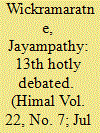

|
|
|
|
|
| Publication |
2009.
|
| Summary/Abstract |
The defeat of the LTTE as a military force has not made the ethnic question in Sri Lanka go away. If anything, the need for political solution has become ever more urgent. The euphoria over the military victory must allow the debate on power sharing and devolution to die. While these discussions take place, it is useful to go back to power-sharing arrangements already in place, and examine where they fall short.
|
|
|
|
|
|
|
|
|
|
|
|
|
|
|
|
| 2 |
ID:
172089
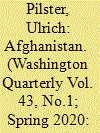

|
|
|
| 3 |
ID:
138420


|
|
|
|
|
| Summary/Abstract |
Although there is now a wealth of scholarship concerning the onset, duration, and termination of civil wars, there is not nearly as much empirical research by political scientists on the potential for postconflict democratization in countries that have been the site of civil wars. This relative scholarly neglect of post–civil war democratization stands in contrast to the efforts and resources that other actors—foreign ministries, international and nongovernmental organizations, and members of civil society—have invested in attempting to help construct democracy in postconflict states such as Indonesia, Liberia, and Uganda.
|
|
|
|
|
|
|
|
|
|
|
|
|
|
|
|
| 4 |
ID:
080802


|
|
|
|
|
| Publication |
2008.
|
| Summary/Abstract |
Neither the devolution of powers to the Basque Autonomous Community in Spain nor more than a decade of power-sharing within this region has led to a peaceful settlement of the Basque conflict. Combining Kriesberg's approach to conflict resolution and consociational theory, past power-sharing experiences are analysed. The lack of overarching loyalties, traditions of compromise, comprehensive participation and the continuation of violence have frustrated power-sharing. After the 2006 ceasefire, the conditions for giving the conflict a constructive turn have not fundamentally changed. The potential for alternative forms of power-sharing as a way out of the Basque conflict, combined or not with innovative territorial arrangements cannot be employed because of multi-scale polarisation. De-escalation as a prerequisite for new types of power-sharing arrangements requires relearning democratic pluralism and a recognition of ethnic hybridity in this politically and geographically fragmented society
|
|
|
|
|
|
|
|
|
|
|
|
|
|
|
|
| 5 |
ID:
196079


|
|
|
|
|
| Summary/Abstract |
Little is known about civil war settlements' effects on public opinion in countries emerging from conflict, cases in which beliefs in agreement fairness and trust in political authorities may influence acceptance of the peace process. We posit that settlements designed to redistribute power and resources will be perceived as fairer and produce larger improvements in trust in the national government for individuals from marginalized groups than for those from dominant groups. Employing original survey data collected in the Philippines, we test these propositions with reference to the country’s 2014 peace agreement. We find that marginalized Muslim groups perceive a fairer peace agreement and report improved trust in comparison to the dominant Christian community. Using a survey experiment to analyze the influence of power-redistributing settlement measures, we find that trust in the government is not significantly affected by information regarding power sharing, a result that holds for members of both communities.
|
|
|
|
|
|
|
|
|
|
|
|
|
|
|
|
| 6 |
ID:
077655
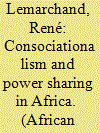

|
|
|
|
|
| Publication |
2007.
|
| Summary/Abstract |
Although there are obvious merits to the consociational argument, including the need to recognize the claims of minorities through power-sharing arrangements, translating theory into practice has generally failed in much of Africa. The reasons for this are many and are by no means reducible to single-factor explanations. Looking at the recent experiments in power sharing in former Belgian Africa, this article offers a comparative assessment of the radically different trajectories followed by Rwanda, Burundi, and the Democratic Republic of the Congo (DRC) in their efforts to regulate conflict through consociational formulas. Although Rwanda stands as a textbook example of failed power sharing, and the DRC as a less than successful experiment, Burundi, which comes nearest to institutionalizing the Lijphart model, offers grounds for cautious optimism about the merits of a consociational polity. On the strength of the evidence from Burundi, one might conceivably argue that the key to success lies in the extent to which the technicalities of power sharing tend to approximate the conditions spelled out by Lijphart, notably group autonomy, proportionality, and the minority veto. Closer scrutiny of the cases at hand suggests a somewhat different conclusion. Perhaps even more importantly than the mechanics of power sharing, the socio-political context is what spells the difference between success and failure
|
|
|
|
|
|
|
|
|
|
|
|
|
|
|
|
| 7 |
ID:
162084
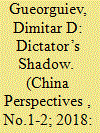

|
|
|
|
|
| Summary/Abstract |
President Xi Jinping is arguably the most powerful Chinese leader since Chairman Mao. Recent constitutional revisions and a midterm leadership reshuffle has only substantiated the fear that Xi, like Mao, has no intention of handing over power to a future successor. Does Xi’s rise signal an end to collective leadership and does a stronger president translate into a weaker party? In this article, I review the methods by which Xi has come to consolidate power as well as the implications for Chinese elite politics in the future. Drawing insights from the comparative literature, I question the zero-sum relationship between executive and institutional strength. Although Xi has certainly amassed unprecedented personal power, it has not necessarily come at the expense of the Party. Instead, the dangers of Xi Jinping’s power grab are more likely to result from a chilling effect on dissenting opinions and thinning out of the leadership pipeline, each of which is likely to undermine governing capacity over the medium to long-term.
|
|
|
|
|
|
|
|
|
|
|
|
|
|
|
|
| 8 |
ID:
090214
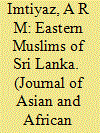

|
|
|
|
|
| Publication |
2009.
|
| Summary/Abstract |
Conflict in Sri Lanka between the Tamils and the Sinhalese brought the Eastern Muslims into the crossfire. Muslim elites and politicians generally cooperate with the Sinhalese ruling class. Such cohabitation irritated the Tamils. Since 1985, relations between the Tamils and the Muslims in the Eastern region have become strained, and Muslims claimed they have some problems to be solved. This study attempts to identify some special problems of the Eastern Muslims. A questionnaire on the special problems of the Eastern Muslims was distributed to the Eastern youth, students, unemployed Muslims and farmers. The population of the target group was selected randomly. More than 150 questionnaires were issued with a 75 percent response rate. Interviews were also conducted on the phone with an educated section of the Eastern Muslims. This study also suggests solutions to the protracted ethno-political conflict based on power sharing.
|
|
|
|
|
|
|
|
|
|
|
|
|
|
|
|
| 9 |
ID:
112417


|
|
|
|
|
| Publication |
2012.
|
| Summary/Abstract |
India's role in Sri Lanka assumes more significance now than before, with the end of war and devolution of power sharing in limbo. While the LTTE is wiped out militarily and isolated internationally, the existing militarisation in Jaffna with war crime charges at UN and awaiting political solution in limbo, Sri Lanka demands India's attention. The call for India's greater engagement with Sri Lanka had resurfaced domestically with a demand from Tamil Nadu parties urging India to play a more proactive role pertaining to rebuilding and sustaining peace in post-war Sri Lanka, and in ending assault on Indian fisherman at Palk Strait. On other hand, the fostering of ties between Sri Lanka and Pakistan and China push for more primed hands-on role from the point of view of India's long-term strategic interest. There is, therefore, a need to have a re-look of India's policy options towards Sri Lanka in light of recent developments.
|
|
|
|
|
|
|
|
|
|
|
|
|
|
|
|
| 10 |
ID:
148651


|
|
|
|
|
| Summary/Abstract |
Negotiations for the settlement of the Cyprus question have resumed amid a pressing geopolitical and economic reality. Greek and Turkish Cypriots adopt distinct interpretations of the United Nations – designated recipe for a bicommunal and bizonal federation in Cyprus. In the relative absence of major normative preconditions for settlement, including a lack of common vision and mutual trust, the pillar notions of federalism and consociationalism have been adapted to serve each side’s vital security concerns and to increase each side’s leverage in a future federal arrangement in Cyprus. This study conducted an opinion poll of young, educated Greek Cypriots to identify the preferred type of constitutional settlement in the context of a number of perceived motives, constraints, and preconditions. The findings of this survey reveal substantial consensus on the acceptance of a bizonal, bicommunal solution. Yet acceptance of a federal solution is subject to certain prerequisites. The study reveals the varying influence of current economic concerns on a prospective solution.
|
|
|
|
|
|
|
|
|
|
|
|
|
|
|
|
| 11 |
ID:
127865


|
|
|
|
|
| Publication |
2014.
|
| Summary/Abstract |
Russian energy policy is usually considered in the regional context - in terms of its energy power capability and strength vis-à-vis the EU and the post-Soviet states. This study shows that in order to understand Russia's energy power, even in the regional context of its relations with the EU, it is necessary to consider the impact of international changes in the energy sector. The oil and gas shale "revolutions" represent such a global factor of influence. Even if their consequences are not yet clear, they have already become an important challenge for Russian energy policy and power. This policy-oriented article, guided by neoclassical realism, analyzes what the shale "revolutions" mean for Russia's energy policy and its power capabilities vis-à-vis the EU, how the Russian political elite perceive this development and how Russia reacts to it. In this context, Russian power capabilities look more moderate.
|
|
|
|
|
|
|
|
|
|
|
|
|
|
|
|
| 12 |
ID:
162434
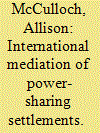

|
|
|
|
|
| Summary/Abstract |
Power sharing is largely accepted among scholars and policy-makers as a potentially effective mechanism for building peace in the aftermath of violent ethnic conflicts and self-determination disputes. Although the operation of power sharing may be prone to ongoing challenges and even political crises arising from the legacy of the conflict, international actors continue to promote power-sharing arrangements to manage self-determination and other ethnopolitical conflicts. This article investigates the normative and instrumental reasons why third-party mediators (on behalf of international organizations and/or states) turn to power-sharing strategies during peace negotiations. It considers the reasons why third-party mediators promote power sharing when its maintenance is likely to depend on their ongoing commitment and governance involvement. We argue that mediators draw from four different perspectives in their support of power-sharing settlements: international law, regional and internal security, democracy and minority rights, and a technical approach where mediators focus on the mechanics of power-sharing designs. The article draws on in-depth semi-structured interviews with officials from the United Nations and the European Union working for the organizations’ respective mediation units as well as documentary analysis of official mediation documents.
|
|
|
|
|
|
|
|
|
|
|
|
|
|
|
|
| 13 |
ID:
087691
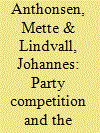

|
|
|
|
|
| Publication |
2009.
|
| Summary/Abstract |
This article argues that after the Golden Age of capitalism, corporatist methods of policy-making have come to depend on specific modes of party competition. In contrast to previous studies of corporatism, which have argued that corporatism depends on strong social democratic parties, this article suggests that the competition between well-defined left-wing and right-wing 'blocs' has become detrimental to corporatism. In countries with mixed governments or traditions of power-sharing, on the other hand, corporatism thrives. These conclusions are based on a comparison of four traditionally corporatist countries - Denmark, the Netherlands, Sweden and Switzerland - from the early 1970s to the late 1990s.
|
|
|
|
|
|
|
|
|
|
|
|
|
|
|
|
| 14 |
ID:
173867


|
|
|
|
|
| Summary/Abstract |
A key political feature of South Africa's transformation was the African National Congress, the National Party and Inkatha Freedom Party working together in a grand coalition. This arrangement was praised by leading power-sharing theorist Arend Lijphart. The unity government began in 1994 but two years later the National Party withdrew. This article explores power sharing during the initial phase of the settlement and discusses three aspects of it. First, the South African example points to the electoral drawbacks of power sharing for minor parties. Second, the National Party's participation in the coalition stifled the early development of substantial political opposition which slowed the pace of democratic consolidation. Third, participation in a power-sharing arrangement undermined the National Party's electoral fortunes contributing to its dissolution in 2005. This was an unexpected outcome for a party which had co-authored the country's settlement a little over a decade earlier.
|
|
|
|
|
|
|
|
|
|
|
|
|
|
|
|
| 15 |
ID:
096125
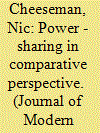

|
|
|
| 16 |
ID:
187658
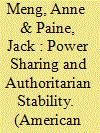

|
|
|
|
|
| Summary/Abstract |
Regimes founded in rebellion are, typically, extremely durable. We propose that this stability is founded upon peaceful power sharing between the rebel regime leader and military elites. Amid long and intense fighting, rebel leaders must delegate control to top military commanders because doing so helps them to win battles. After seizing power, power-sharing deals between former combatants are highly credible due to their history of interactions, which mitigates the guardianship dilemma. Elsewhere, a persistent internal security dilemma often undermines power-sharing deals. Using originally collected data on African regimes from 1960 to 2017, we establish that rebel regimes break down seldomly compared with other authoritarian regimes and they experience fewer coups. Regarding the mechanism, rebel regimes more frequently share power with military elites by appointing a Minister of Defense. These Ministers are typically high-ranking members of the rebellion, which reflects the regime’s replacement of the state military with their own.
|
|
|
|
|
|
|
|
|
|
|
|
|
|
|
|
| 17 |
ID:
194784


|
|
|
|
|
| Summary/Abstract |
In postconflict settings, peace agreements often include power-sharing provisions that integrate formerly warring parties into the state. The aim of such provisions is to prevent conflict from resuming. At the same time, however, they can inadvertently increase the risk of coups d’état. Existing research identifies a correlation between peace agreements and coups, but the causal mechanisms underlying this association remain underexplored. This article argues that power sharing affects the motives of incumbent elites to intervene in politics via a coup and the opportunity for former rebels to do so successfully. Evidence from coup attempts in Burundi and Guinea-Bissau illustrates the plausibility of these arguments and suggests ways to extend them in future work. While debate remains over whether power sharing prevents civil war recurrence, this article shows how it can create incentives for other forms of political violence.
|
|
|
|
|
|
|
|
|
|
|
|
|
|
|
|
| 18 |
ID:
168553


|
|
|
|
|
| Summary/Abstract |
What effect do power-sharing institutions agreed to as part of civil war settlements have on the development of the rule of law in post–civil war states? We contend that power-sharing measures facilitate the emergence of the rule of law in two ways. First, they establish a form of institutional constraint that promotes judicial autonomy and independence. Second, they foster a sense of security among judges and other political actors that bolsters commitment to the law. We demonstrate the plausibility of a positive relationship between power sharing and the rule of law through an analysis of post–civil war states between the years 1948 and 2006. Our findings suggest that civil war settlements can help to establish the rule of law when they include mechanisms aimed at allaying the insecurities of political actors in the postconflict environment.
|
|
|
|
|
|
|
|
|
|
|
|
|
|
|
|
| 19 |
ID:
108962
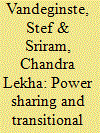

|
|
|
|
|
| Publication |
2011.
|
| Summary/Abstract |
Recent peace negotiations practice has given rise to the emergence of two paradigms. In line with normative developments in global human rights protection, internationally brokered peace processes often address the options for accountability for abuses committed in the past and generally cannot include blanket amnesties. At the same time, many agreements end armed conflicts by offering power-sharing incentives for warring parties. In most cases, power-sharing arrangements are likely to clash with attempts to meaningfully deal with truth, accountability, and reparation for past abuses. The tension between the two paradigms gives rise to a number of important challenges and constraints for policymakers and, thus far, there is little practical evidence to guide them in managing the clash.
|
|
|
|
|
|
|
|
|
|
|
|
|
|
|
|
| 20 |
ID:
115727
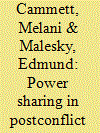

|
|
|
|
|
| Publication |
2012.
|
| Summary/Abstract |
Which components of power sharing contribute to the duration of peace and what explains the linkages between institutional design and stability? The authors argue that certain types of political power sharing are associated with more durable peace than others, primarily through their positive effects on governance and public service delivery. In particular, closed-list proportional representation (PR) electoral systems stand out among power-sharing arrangements, due to their ability to deliver superior governance outcomes which, in turn, can promote stability by undercutting the initial motivations for conflict or by reducing the feasibility of rebellion. The authors argue that these positive outcomes result from closed-list PR's ability to increase party discipline and checks on executive power, while reducing incentives for personalistic voting. The introduction of political institutions in postconflict negotiated settlements allows us to test the independent effects of institutions on governance and stability using survival analysis and a case study.
|
|
|
|
|
|
|
|
|
|
|
|
|
|
|
|
|
|
|
|
|